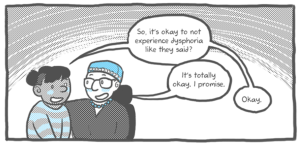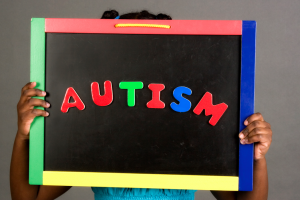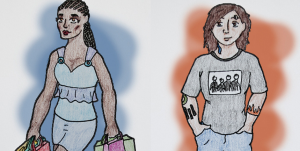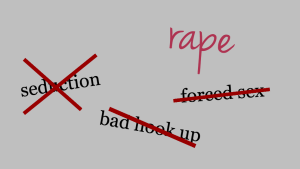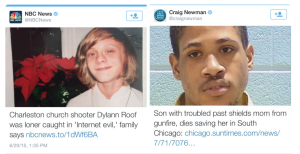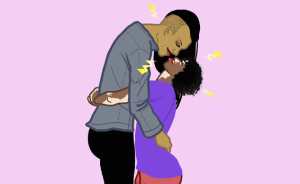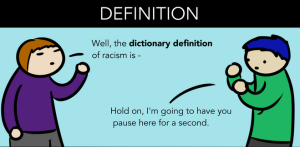
Two people sitting with backs facing on a bench.
I’m a rape and sexual assault survivor. For almost two years, I was in an emotionally, sexually, and physically violent friendship that frequently crossed my boundaries and made me feel unsafe.
It took time for me to heal from what happened and relearn that the situation wasn’t my fault.
My abuser never took full accountability for their actions, and in many cases, never even admitted that they committed violence.
After becoming a survivor, the biggest mistake I made was not being accountable for my own behavior.
As upsetting as it is to admit, just because I’m a survivor doesn’t mean that I never slip into behaviors that are manipulative or abusive.
Several years ago, I fell into the habit of breaking up with my partner whenever we had a serious fight. When our fights would escalate, I would say something along the lines of, “Why don’t you just break up with me then?”
This behavior hurt my partner, and our relationship, deeply. But when she tried to talk to me — both during the fight and later, after things had calmed down — about how manipulative the behavior was, I blew her off.
I’d say, “When we fight, I get scared and defensive. I think you don’t love me, and I wonder why you should. That’s why I bring up ending the relationship.” As a survivor of an abusive intimate relationship, I struggle with the feeling that I’ll never be good enough.
During fights, I’d fall into this behavior as a defense mechanism, hoping that my partner would break the cycle by insisting that we stay together because she loved me.
It was an emotionally manipulative tactic that hurt my partner repeatedly and put our relationship in jeopardy.
In order for my partner to heal, it was critical for me to take accountability for my actions without creating excuses or looking for a way to defend my behavior.
When we fight with the people closest to us, it usually involves verbal or written communication afterward about how and why the fight happened, any necessary apologies, and a strategic plan so that the fight doesn’t happen in the future.
But a lot of times, these conversations turn into a way for someone to excuse behavior that has hurt someone else—often by framing it based on their own feelings.
When I was saying, “I realize that I hurt you, but I was hurt too,” I wasn’t taking full accountability. I was using it as an opportunity to justify my actions.
We need to remember that accountability is a process, and there are steps we can take to responsibly take accountability for the harm we’ve done to another person.
Here are some helpful steps:
1. Stop the harmful behavior.
The first step in taking accountability for harmful behavior is stopping the behavior.
Naming what we’re doing and acknowledging it is important, but for the sake of the person being harmed, cease the harmful behavior. After we’ve done that, we can take time to self-reflect, educate ourselves, and name what’s been happening.
My dad actually helped me through this process after he witnessed one of our worst fights.
What he told me was, “I know you’re angry and upset in the moment, but take an extra second before you speak. If you really feel like you want to end the relationship, commit to taking twenty-four hours to think about it. After a day, if you still feel that way, you can talk to her about it.”
It sounds simple, but it was an important step. The next time my partner and I fought, I felt the same feelings of inadequacy bubbling up.
“Why does she want to be with me?” I thought. “She should just break up with me.” My immediate instinct was to tell her that, but I remembered my commitment to giving it another twenty-four hours.
By using this tool, I was able to immediately stop the harmful behavior and move toward taking accountability for my actions.
2. Name the behavior.
Once we’ve immediately stopped the behavior that’s hurting someone else, we need to acknowledge what the behavior is.
The important part of this step is that it’s manageable: to create sustainable accountability and change, we need to work in a process with manageable goals.
It’s not always realistic to say, “I’ll stop this manipulative behavior immediately, and understand its full impact on the person I have hurt.”
In my situation, this looked like me acknowledging that I was using breakup language during fights with my partner when I didn’t want to actually break up.
3. Acknowledge the effects your behavior has on others.
Even if we didn’t intend to do harm, it’s important for us to move from acknowledging that our behavior was harmful to acknowledging the effects our behavior had.
This is a step where people tend to naturally make excuses for their behavior. It often looks like: “I know what I did really hurt you, but…” We need to commit to not making excuses, to not using that “but.”
During this step, I worked on understanding how my behavior hurt my partner and our relationship without bringing my own feelings into it. I had to actively resist the urge to add a “but,” whether I was thinking about it on my own or in conversation with someone else.
It was critical for me not to make excuses—to simply recognize that it was extremely harmful to threaten my partner with breakups during our fights. It was manipulative behavior, whether or not I intended it to be, and it caused my partner to be afraid and lose trust in me.
4. Make repairs for the harm caused.
Ideally, these repairs are ones requested by the person who was harmed.
It might look like a sincere apology for the harm caused. It could be a more public apology, in front of a group or community.
Or it could be financial repairs—money for the person harmed, for damages to property, return of funds that were stolen or spent carelessly, or taking over the person’s credit card or debt payments.
Repairs should always be accompanied by a commitment to stop the violent actions, now and in the future.
When my partner asked for repairs for my use of breakup language, the most important thing to her was for me to commit to never doing it again—with action that backed that commitment up, no matter how upset I was at the time.
In addition to that, I gave her a sincere verbal apology, without excuses, that acknowledged the harmful behavior. I named that I had been using the language of breaking up during our intense fights and that it was manipulative and caused harm to her and our relationship.
I admitted that it made her feel afraid and that as a result, she lost trust in me because I was resorting to this kind of behavior during a fight instead of focusing on the argument at hand, whatever it may be.
5. Change harmful attitudes and behaviors.
To make sure that the harmful behavior isn’t repeated, you need to commit to changing any harmful attitudes and behaviors. This involves deep self-reflection, so it will look different for every individual and situation.
Some examples may include letting go of controlling behavior, seeking support to deal with trauma and abuse, dealing with feelings of insecurity or jealousy, and shifting a sense of superiority over others.
For me, this included a lot of self-reflection about why I felt undeserving of my partner’s love, particularly during fights. I sought therapy for the violent relationship I’d been in, and I talked to my therapist about my feelings of insecurity and self-doubt.
It was my responsibility to work through the issues that were causing me to act out during our fights, and figure out how to change in a sustainable way.
****
The process of responsibly taking accountability for causing harm to someone else will look different for everyone and for each individual situation. Going through it once also doesn’t make us immune from revisiting the process if another harmful behavior crops up, either.
It’s easy to feel defensive or scared during this process. If you’re admitting that you caused harm, particularly if you didn’t intend to, you might feel a sense of shame about it or connect that harm with who you are as a person.
Especially for those of us who are abuse survivors, it can be terrifying to think something like, “Am I an abuser, too?”
It’s important to step back in these situations and acknowledge that while we feel guilt, we don’t have to feel shame. We should separate our guilt—for specific actions—from shame, and remember that it isn’t about who we are as a person.
We’re in a better position to take accountability in a responsible way when we don’t focus on our own shame and instead focus on the action as something we’re capable of changing.
When we do something that hurts another person, we also have to remember: even if they aren’t able to forgive us, now or in the future, we need to forgive ourselves.
Instead of using all my emotional energy thinking about my shame and anger at myself, I used it to challenge my own insecure thoughts and work on creating a sustainable change, so that my fights with my partner would be healthy.
I reminded myself that if I was able to change, I would no longer be causing harm to her or to the relationship, and I would be moving in a positive direction. My actions didn’t define me, what defined me was what I did now to take accountability and continue to grow.
When we move forward in the accountability process, we’re helping ourselves become more considerate, thoughtful, and proactive people to everyone in our lives.
We deserve self-love so that we can continue to take responsibility for our actions, and improve our relationships with ourselves and others.
[do_widget id=’text-101′]
Alaina Leary is a Contributing Writer for Everyday Feminism. She is a Bostonian currently studying for her MA in publishing at Emerson College. She’s a disabled, queer activist and is on the social media team at We Need Diverse Books. She can often be found re-reading her favorite books and covering everything in glitter. You can find her at her website or on Instagram and Twitter @alainaskeys. Read her articles here.
Search our 3000+ articles!
Read our articles about:
Our online racial justice training
Used by hundreds of universities, non-profits, and businesses.
Click to learn more





